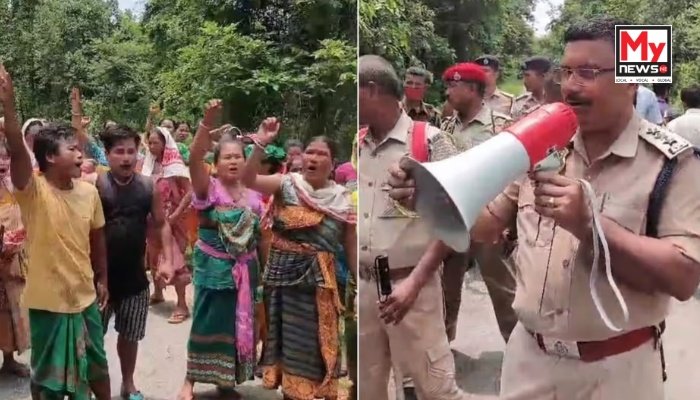
Assam: Protests Erupt in Kokrajhar Over Adani Thermal Power Plant Project
Kokrajhar, Assam: A significant protest has erupted in the Paglijhora Part-II area of Kokrajhar district, under the Parbhatjhora subdivision, as indigenous Bodo communities vehemently oppose an eviction drive by the Adani Group for the construction of a thermal power plant. The project, a partnership with the Assam Power Distribution Company Limited (APDCL), has ignited widespread condemnation and fears among the local populace.
On Wednesday, representatives from the Kokrajhar district administration and the Adani Group attempted to establish a border and initiate eviction procedures on the proposed project site. However, their efforts were met with fierce resistance from the local residents, who accused the administration of proceeding without their consent and approval.
Daorao Dekrab Narzary, Executive President of the Boroland Jan-Jati Suraksha Manch, strongly denounced the decision to allocate land in a Sixth Schedule territory to a private corporation. Narzary raised serious concerns about the potential environmental impact of the thermal power plant, highlighting the risk of extensive forest damage and the displacement of indigenous villages. He warned that protests would continue unabated if the land transfer proceeded without the explicit approval of the local communities.
The controversy stems from a decision by the Assam government to allocate approximately 480 hectares of land to the multinational conglomerate Adani Group for the thermal power plant. This move has sparked widespread protests across the Parbatjhora area in Kokrajhar district, with critics citing potential changes in land use patterns and adverse effects on the region’s existing natural resources, including water and air.
The proposed site, located in the Paglijhora area of Bashbari under the Parbatjhora Forest Division, encompasses 125 and another 50 hectares of mixed plantation, boasting over 500,000 sal and teak trees. This has triggered serious environmental and constitutional concerns, drawing fierce condemnation from local residents, social and environmental activists, civil society organisations, and political leaders alike.
Crucially, the land in question falls within the Bodoland Territorial Region (BTR), an autonomous administrative division governed by the Sixth Schedule of the Indian Constitution. This constitutional provision primarily reserves land within the BTR for indigenous tribal communities, allowing for very limited exceptions. Critics firmly argue that the Adani Group has no legal or constitutional right to acquire or settle on such land for a commercial project like a thermal power plant.
Moon Moon Brahma, the MCLA of Parbatjhora, recently visited Paglijhora village, near the proposed project land in the Bashbari area, expressing unwavering solidarity with the protesting public. “I am with you and will always be with you,” Brahma declared, publicly questioning the authority of Bodoland Territorial Council (BTC) Chief Executive Member (CEM) Pramod Boro to “give the land of Parbatjhora to Adani Group for the sake of Pramod Boro’s own interests.”
Mounting concerns revolve around the potential severe harm and disruption to the predominantly indigenous tribal populations residing in close proximity to the proposed plant. Experts and activists are warning of dire consequences, including increased air and water pollution, soil degradation, a rise in health issues, and significant disturbance to the already fragile ecological balance of the region.
Coal-fired power plants are known emitters of various pollutants into the atmosphere, including Sulphur Dioxide (SO), Carbon Monoxide (CO), Oxides of Nitrogen (NOx), and Ozone (O). Suspended Particulate Matter (SPM), Lead, and Non-Methane Hydrocarbons are also released. The formation of SO due to excess oxygen can lead to acid rain when it mixes with atmospheric water. SPM, primarily soot, smoke, and fine dust particles from coal power plants, is a known cause of asthma and other respiratory illnesses.
Furthermore, thermal power plants consume significant amounts of water for coal washing, steam generation in boiler furnaces, and equipment cooling. The dust from coal-cleaned water can contaminate groundwater. Discharging hot water into water bodies without adequate cooling can raise their temperature, adversely affecting aquatic flora and fauna. Untreated air and water pollutants from coal power plants can render adjoining areas unfit for living or livelihood activities, severely impacting both water quality and the local ecosystem.
In response to this escalating crisis, the Joint Land Struggles Committee, Assam, has recently extended its full support to the protesting communities. Subrata Talukdar, convener of the committee, recently visited the proposed land area in Basbari and made strong remarks, alleging that the government’s actions are an attempt to repay debts by “selling the land of tribals like Karbi, Bodo, Rabha etc. to Adani and Ambani.”
The widespread mobilization calls for mass resistance against the actions of both the State Government and the Bodoland Territorial Council. Protesters emphasize the urgent need for a united movement involving all stakeholders to safeguard the land rights and environmental integrity of the BTR in Kokrajhar.
Read More: Phulera Calling Again: Panchayat Season 4 Set for June 24 Premiere
